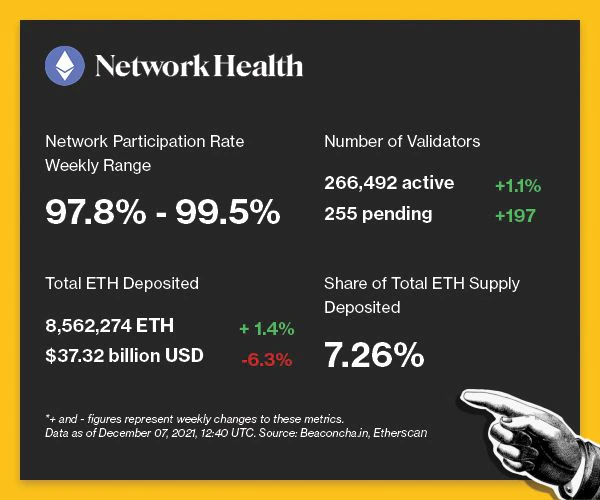Last week, Ethereum co-founder Vitalik Buterin brought forth Ethereum Improvement Proposal (EIP) 4488, an upgrade that could drive down transaction costs for Ethereum rollups like Arbitrum, Optimism and zkSync. The proposal detailed the immediate steps for pushing gas fees down without sacrificing security, as well as the roadmap for moving forward post-Merge. Here are some of the ideas contained within the proposal:
- Layer 2 rollups batch users’ transactions and post them to mainnet via “calldata.” Calldata is defined by OpenZeppelin as “a read-only byte-addressable space where the data parameter of a transaction or call is held.” According to Buterin’s blog post, the upgrade would reduce the cost of posting calldata onto mainnet, further driving down costs for end users.
- In their current state, Ethereum block sizes are healthy enough that EIP 4488 combined with other upgrades would not add any significant costs to maintaining a node. Keeping block size small is essential for maintaining decentralization and ensuring anybody can run a node.
- Increasing data space alone would put strain on node operators, as storing the entire history of the network would be too large for average computers. A complementing proposal to offload a node’s responsibility of storing blocks one year or older would solve this issue.
- By socializing gas costs across multiple transactions, Optimistic rollups have already driven transaction fees down 3-8x, and ZK-rollups are 40-100x cheaper than Ethereum’s base layer. Buterin expects increasing data space could “decrease costs for rollups by ~5x.”
- Buterin hinted that rollups will likely be the short-, medium- and long-term solution to scaling Ethereum. Introducing sharding to Ethereum’s proof-of-stake network will further allow the blockchain to scale and make transactions cheaper for layer 2 rollups.
Read more about EIP 4488 here.
Welcome to another edition of Valid Points.
Pulse check
The following is an overview of network activity on the Ethereum 2.0 Beacon Chain over the past week. For more information about the metrics featured in this section, check out our 101 explainer on Eth 2.0 metrics.

Disclaimer: All profits made from CoinDesk’s Eth 2.0 staking venture will be donated to a charity of the company’s choosing once transfers are enabled on the network.
Validated takes
- Securitize aims to solve know-your-customer (KYC) compliance rules for wallets interacting with Aave Arc, an institutional arm of the decentralized finance (DeFi) lending giant. BACKGROUND: Aave Arc is a subsection of Aave that allows whitelisted institutions to utilize high liquidity lending pools in a regulated manner. Securitize is looking to match institutions with a specific wallet address, which would otherwise be anonymous.
- Centralized exchange Bitmart was exploited for $196 million via a private key hack. BACKGROUND: While DeFi is often scrutinized for smart contract risks and recurring exploits, centralized exchanges prove they face similar challenges. Users will be refunded in this case, as Bitmart will compensate those affected by the hack. Personal and institutional private key security continues to be a weak point for crypto adoption.
- Binance and Animoca Brands teamed up to invest $200 million in gaming applications built on Binance Smart Chain. BACKGROUND: Metaverse and blockchain gaming applications have gained significant traction during the second stages of the NFT craze. Alternative layer 1s and Ethereum layer 2s are massively incentivizing game founders with seed investments and native token rewards, looking to establish the first decentralized gaming ecosystem.
- Internal issues at Sushi caused core members to step down and created community-wide drama. BACKGROUND: Token launches have proven to be an efficient way of bootstrapping a protocol, but longevity issues can arise down the road. The current model of most DeFi products pays a significant portion of revenue to liquidity providers and token stakers, creating treasury issues later on. Sushi has struggled to retain talent and align incentives with token holders as core team members claim they are underpaid.
Factoid of the week

Open comms
Valid Points incorporates information and data about CoinDesk’s own Eth 2.0 validator in weekly analysis. All profits made from this staking venture will be donated to a charity of our choosing once transfers are enabled on the network. For a full overview of the project, check out our announcement post.
You can verify the activity of the CoinDesk Eth 2.0 validator in real time through our public validator key, which is:
0xad7fef3b2350d220de3ae360c70d7f488926b6117e5f785a8995487c46d323ddad0f574fdcc50eeefec34ed9d2039ecb.
Search for it on any Eth 2.0 block explorer site.














